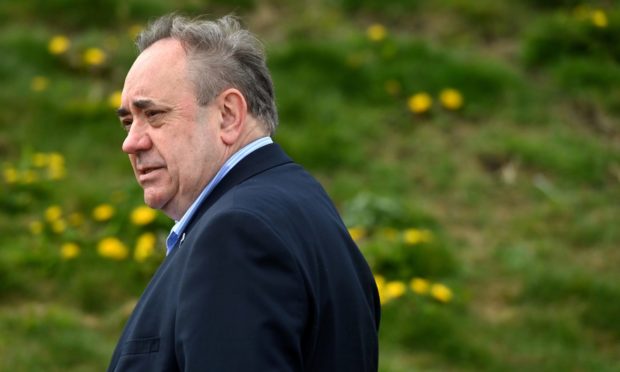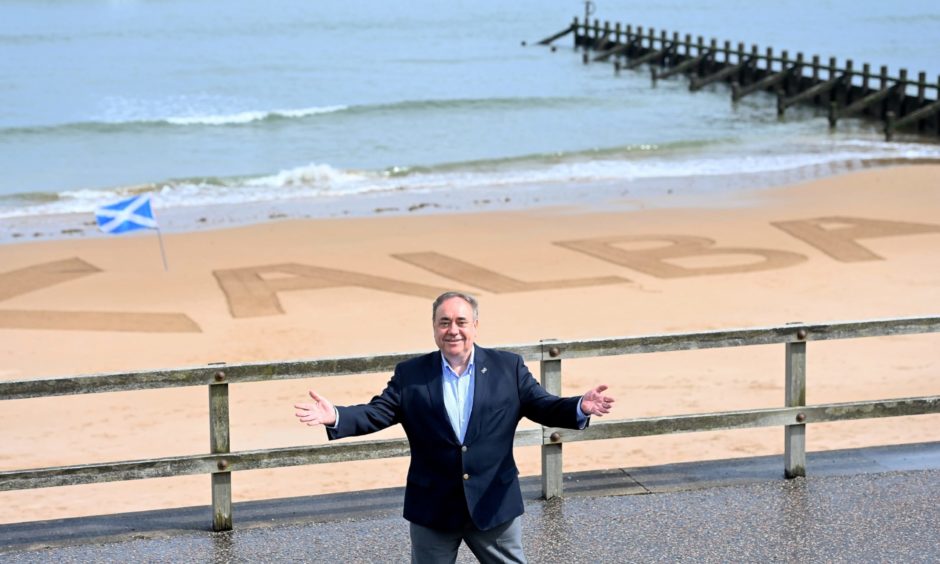Alex Salmond has seen his popularity plummet further, as new polling suggests he is the least popular political leader in the UK with just one day left until voters go to the polls.
Polling carried out by Survation for DC Thomson shows Alex Salmond is significantly less popular with Scottish voters than Prime Minister Boris Johnson.
The survey of 1,008 voters shows just 9% hold a favourable view of him, down from 10% in our previous poll, in April, and 74% hold an unfavourable view of him, giving him a net rating of -65.
The polling, which was carried out between April 30 and May 4, suggests Scottish Labour leader Anas Sarwar’s popularity is steadily growing, coming second only to First Minister Nicola Sturgeon in the popularity stakes.
A total of 34% of voters think favourably of Mr Sarwar, up 4% from our last poll, and 21% hold an unfavourable opinion, putting him at a net rating of +12.
The Scottish Labour politician is also more popular with Scots voters than UK Labour leader Sir Keir Starmer, who is thought of favourably by 27% of those polled.
Ms Sturgeon, who will face off against Mr Sarwar in the Glasgow Southside constituency, remains Scotland’s most popular political leader with a rating of +19.
When those with unfavourable views are subtracted from favourable to give a net score, only Sturgeon and Sarwar have positive ratings.
Our exclusive polling by Survation suggests the results are on a knife edge with the SNP on course for a tight one-seat majority, securing 66 seats.
Meanwhile, Mr Salmond’s Alba Party are predicted to pick up just 3% of the list vote.
But a spokesman for the Alba Party remained optimistic about the party’s electoral fortunes and its quest to deliver a so-called “independence supermajority”.
He added: “This poll confirms that with SNP support riding high in the constituencies and a projected gain of three seats, an SNP vote on the list is a wasted vote as the SNP will struggle to win any seats on the list.
“It is vital that people who believe in independence vote for Alba on the list to make both of their votes count for independence rather than waste it and see more unionist MSPs elected.
“Alba is confident that as that message hits home on the doorsteps that support for Alba will continue to rise between now and polling day and see Alba MSPs elected as part of an independence supermajority.”
SNP depute leader Keith Brown said: “By giving both votes to the SNP on Thursday, people can guarantee experienced leadership, a serious programme for government and a re-elected SNP Government, led by Nicola Sturgeon, which will put Scotland’s future in Scotland’s hands – not Boris Johnson’s.”
Douglas Ross less popular than Ruth Davidson
The survey will make disappointing reading for Scottish Tory leader Douglas Ross, whose favourability pales in comparison to that of his predecessor Ruth Davidson.
He is popular with just 18% of voters, the poll suggests, compared to 31% for the former leader of his party, Ms Davidson.
A Scottish Conservative party spokesman said: “Ruth Davidson is the most popular pro-UK politician in Scotland over the last five years and she has been a fantastic asset to Douglas Ross and the Scottish Conservatives throughout this campaign, where they have asked pro-UK voters for their peach party list votes to stop an SNP majority, stop indyref2 and get all of the focus on rebuilding Scotland.”
The Prime Minister is popular with 23% of voters but the majority (63%) have an unfavourable opinion of him, a net rating of -40%.
Meanwhile, the survey suggests Scottish Liberal Democrat leader Willie Rennie is popular with 19% of voters, a net of -11%, and shows 20% rate Scottish Greens’ co-leader Patrick Harvie favourably, also a net rating of -11%.


